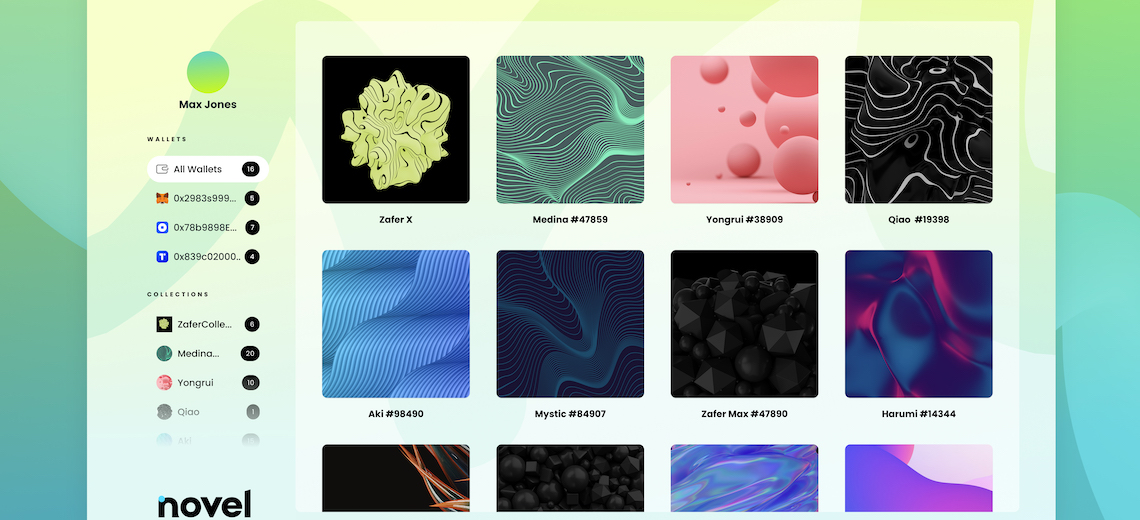With a growing number of major beauty brands launching NFTs, accessible e-commerce platforms are springing up to make purchasing digital artworks as easy as ordering a tube of lipstick.
On April 5, Shopify-enabled Web3 e-commerce platform Novel launched as the latest NFT platform for the general public, allowing NFTs to be ordered with regular currency rather than crypto. Eliminating the need for coding knowledge, the platform has attracted brand partners including Bobbi Brown’s Jones Road Beauty, as well as Everlane.
“Generally speaking, less than 2% of Americans own an NFT. This whole space, right now, is pretty far from mainstream,” said Novel co-founder and CRO Anna Merzi, who previously co-founded payment platform AlgoPay. She teamed up with co-founder and CEO Roger Beaman, who previously founded Smartrr, a platform that helped brands set up subscription programs on Shopify.
Beauty brands have been tapping into a range of platforms allowing regular users to purchase NFTs with a credit card rather than cryptocurrency and demystifying the process. While NFTs have attracted an enthusiastic base of investment-minded collectors hailing from the crypto world, brands are attempting to generate the community and exclusivity aspects of owning NFTs while making them easy to purchase with fiat currency. Nars, for example, used the platform Truesy for its NFT campaign last year, while Givenchy Beauty used the platform VeVe. E.l.f. Cosmetics, meanwhile, went with Bitski for its NFT.
On March 29, MAC Cosmetics’ Keith Haring NFTs went up for sale online via MAC Cosmetics’ e-commerce site. The site only accepted credit cards and not cryptocurrency.
“As a digital-first brand, we are constantly evolving to better meet consumers where they converge online. We have had our sights set on the metaverse and the potential for NFTs to transform how consumers engage with MAC in the future,” said Aïda Moudachirou-Rébois, chief global marketing officer at MAC Cosmetics.
One major benefit of consumer-facing NFT platforms is the removal of extra fees, said Merzi. On “certain blockchains,” the extra fee for purchasing an NFT “can be really high. It can be greater than the token itself,” she said. “We cover that for the consumer so that at no point do they need crypto in order to access their token.”
Ad position: web_incontent_pos1
Aided by promotion from influencers and celebrities, the NFT and crypto world has developed a tight-knit community based around owning NFTs. Collectors gather and form friendships on online platforms like Decentraland and Discord, as well as in real life at conferences and (sometimes lavish) parties. At the massive Bitcoin 2022 conference held in Miami at the beginning of this month, the crypto world was recently self-described by one member as a “cult.”
According to NFT platform founders, brands can leverage this mindset to build their own loyal brand followings around NFTs. Novel allows brands to build communities around NFT ownership in several ways, including through “token-gated storefronts” for NFT owners to have exclusive access to product drops, exclusive mailing lists and access to Discord communities “gated” through a tool called Collab.Land.
“Imagine what brands are trying to do on Instagram with that community, but’s a more intimate setting. Your customers are bought into being a part of the community, so they’re more likely to engage,” said Merzi.
Some brands are still opting for the NFT platforms used by investment-minded collectors. Guerlain announced on April 11 the launch of its NFT collection that would be on the NFT platform Objkt.com, which operates using cryptocurrency. Rather than set up a credit-card platform, the Guerlain site offers step-by-step instructions on how to set up a crypto wallet.
Many brands are also including a charity component with their NFT launches. All of the proceeds from the Guerlain drop will go toward an environmental project in the Millière Valley in France. The brand is addressing sustainability concerns by using the Tezos blockchain, which it calls “one of the most sustainable and energy-efficient blockchains.”
Ad position: web_incontent_pos2
Novel allows users to set up a crypto wallet using the platform Web3Auth, which was formerly called Torus. The crypto wallet is a “single sign-in using Google, so it feels like you’re setting up a regular web account even though it’s a crypto wallet,” said Merzi. It is an alternative to Metamask, which is common among the more experienced NFT and crypto crowd.
“Metamask is generally difficult to use. It’s an intimidating system for the Web2 user because you have a sign-on that looks very different from the sign-on to regular platforms,” said Merzi of the crypto wallet platform.
Novel allows brands to sell JPEG, SVG, GIF or video NFTs, along with physical merchandise through Shopify, making them accessible to customers without experience in cryptocurrency or blockchain platforms like OpenSea. Brands can use it to import artwork, set up royalties and rarity percentages, import image “layers,” and automatically create generative collections along the lines of Bored Ape or World of Women.
“Our on-ramp to Web3 has been easy and seamless, thanks to Novel. As we prepare to connect with our customers in a whole new way, Novel’s platform allows us to focus on finding creative ways to strengthen these relationships [with consumers] without needing to worry about complicated technical implementations that would otherwise be a barrier for both our brand and our customers,” said Cody Plofker, director of e-commerce at Jones Road Beauty, which is in the process of developing its own NFT strategy with details to be revealed at a later date.
Novel has received $6 million in a seed funding round led by VC firm Lerer Hippeau, with additional investment from VaynerFun and Roth Martin (the co-founder of DTC shoe brand Rothy’s), among others. The funding round has also had participation from existing investors Sugar Capital and Costanoa Ventures.




